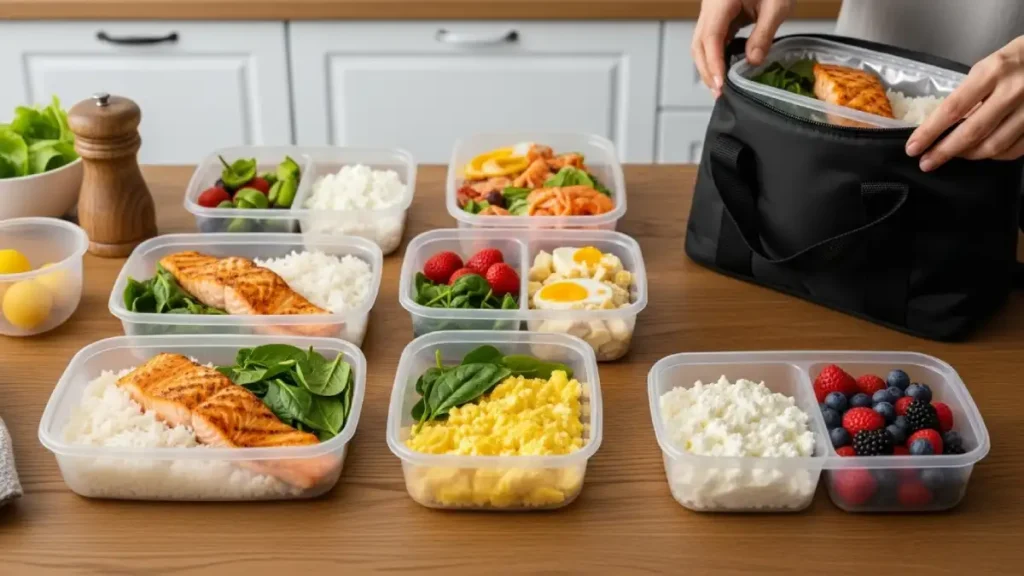Secrets for Build Muscle Faster – How Much Protein Per Day I need it
Can You Consume Too Much Protein?
While protein is essential for muscle building, there’s a point of diminishing returns. Consuming more than 2 grams per kilogram of body weight generally provides no additional benefit for muscle growth and may place unnecessary strain on your kidneys, particularly if you have existing kidney issues.
The Mayo Clinic Health System cautions against excessive protein intake, noting that there’s no advantage to consuming amounts beyond what your body can utilize for muscle building.
Quality Matters: Not All Protein Sources Are Equal
The source of your protein significantly impacts how effectively your body can use it for muscle building. Animal-based proteins like meat, eggs, and dairy provide complete proteins containing all essential amino acids. Plant-based proteins can be equally effective when consumed in varied combinations to ensure all amino acids are present.

High-quality protein sources include:
- Lean meats (chicken, turkey, lean beef)
- Fish and seafood
- Eggs
- Dairy products (Greek yogurt, cottage cheese, milk)
- Soy products (tofu, tempeh, edamame)
- Legumes (beans, lentils, peas)
- Nuts and seeds
For creative ways to incorporate these protein sources into your diet, visit https://uslifestyles.org/easy-meal-prep-for-beginners/.
Combining these foods thoughtfully throughout your day ensures you’re not just hitting your protein numbers but also providing your body with the full spectrum of amino acids needed for muscle growth.
“Think of protein quality like building with different materials—some provide everything you need in one package, while others must be strategically combined to create a complete structure.”
Protein Supplements: Necessary or Optional?
With whole food sources forming the foundation of your protein intake, supplements like whey, casein, and plant-based protein powders can serve as convenient additions to your nutrition plan. These products are particularly useful for meeting increased protein needs during intensive training periods or when whole food options are limited. For smart cooking tools that simplify meal prep, visit https://uslifestyles.org/ai-in-cooking/.
However, supplements should complement, not replace, whole food protein sources. The additional nutrients found in whole foods – vitamins, minerals, and fiber – contribute to overall health and recovery in ways that isolated protein supplements cannot.
Adjusting Protein Intake to Your Individual Response
While research provides valuable guidelines, individual responses to protein intake can vary. Factors like age, genetics, training intensity, and overall diet all influence how your body utilizes protein for muscle growth. Understanding your motivation can help; explore more at https://uslifestyles.org/neuroscience-of-motivation/.
The most effective approach involves starting with the evidence-based recommendations (1.2-2.0g/kg for muscle building), monitoring your progress for 4-8 weeks, and then adjusting based on your results. If you’re not seeing the muscle gains you expect, gradually increasing your protein intake within the recommended range might be beneficial.
The Bottom Line on Protein for Muscle Building
The science is clear: consuming adequate protein is essential for building muscle, with most research pointing to an optimal range of 1.2-2.0 grams per kilogram of body weight per day for those engaged in regular strength training. This amount provides your body with the amino acids needed to repair and build muscle tissue in response to exercise.
Remember these key takeaways:
- Match your protein intake to your activity level and goals
- Consume protein within 2 hours after workout sessions
- Distribute your protein intake throughout the day
- Choose high-quality protein sources
- Consider your individual response and adjust accordingly
By prioritizing protein in your nutrition plan and following these evidence-based guidelines, you’ll create the optimal environment for your body to build the muscle you’ve been working so hard for in the gym. The perfect amount of protein won’t build muscle on its own – you still need to put in the work with resistance training – but it provides the essential foundation that makes your training efforts count. For a comprehensive approach to personal growth, see https://uslifestyles.org/30-essential-strategies-for-personal-growth/.
What protein intake strategy has worked best for your muscle-building goals? Try applying these research-backed recommendations and watch your results transform.
FAQ
Q: Is it possible to build muscle on a plant-based diet?
A: Absolutely. While animal products offer complete proteins, plant-based athletes can build muscle effectively by consuming a variety of plant proteins to ensure they get all essential amino acids. Combinations like beans and rice or pea and rice protein supplements can provide a complete amino acid profile.
Q: Will eating extra protein automatically build muscle?
A: No. Protein provides the building blocks for muscle, but resistance training is necessary to stimulate muscle growth. Without exercise that challenges your muscles, extra protein will not translate to muscle gains.
Q: Should I calculate my protein needs based on my current weight or my goal weight?
A: For muscle building, calculate based on your current weight. As your body composition changes, you can adjust your protein intake accordingly.
Q: How quickly can I expect to see muscle gains with optimal protein intake?
A: Visible muscle growth typically takes 4-8 weeks of consistent training and proper nutrition. However, you may notice strength increases sooner, which is an early indicator that your muscles are responding to your program.
Q: Do older adults need more or less protein for muscle building?
A: Research suggests that older adults (65+) actually benefit from higher protein intakes—around 1.2-2.0g/kg or even higher—due to age-related changes in protein metabolism. This helps combat sarcopenia (age-related muscle loss) and supports muscle maintenance and growth.
-

 Best Picks10 months ago
Best Picks10 months agoDriving Insurance: Get the Best Car Coverage Without Overpaying
-

 Best Rewards3 months ago
Best Rewards3 months agoBest rewards credit cards in 2025 for everyday use
-

 Personal Growth & Mindset1 year ago
Personal Growth & Mindset1 year agoTed Lasso Effect: 5 Goal-Setting Secrets You Must Know
-

 Career & Success1 year ago
Career & Success1 year ago30 Key Strategies for Growth: Mindset, Productivity & Wellness
-

 Personal Growth & Mindset1 year ago
Personal Growth & Mindset1 year agoMachado de Assis: This Viral TikTok Explains Why You Need to Read ‘The Posthumous Memoirs of Brás Cubas’ Now
-

 Career & Success12 months ago
Career & Success12 months agoChallenges of Not Having Goals: 5 tips to help you get started













